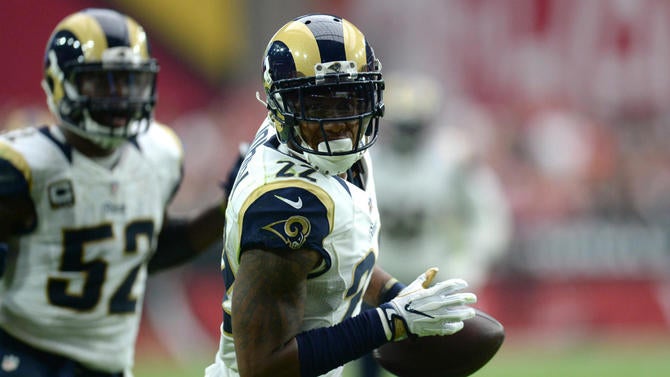Ask and you shall receive. When free agency works in this manner, it is music to an agent’s ears. The process isn’t so smooth for many free agents.
Free agency is a fluid process where there is a risk of an agent pricing a client out of the market if adaptations aren’t made to changing market conditions. Some players are disappointed in free agency’s outcome because their market never develops for a variety of reasons (age, poor contract year performance, injury, supply at playing position, etc.).
Agent and NFL teams have already gotten a sense of the 2017 free agent market. Meetings between agents of impending free agents and teams routinely occur at the NFL combine, which ends on March 6, although these types of discussions are prohibited by NFL rules. Teams are rarely penalized for tampering with players from other teams when those players are scheduled to become free agents.
The exclusive negotiating rights teams have had with their impending free agents ends on March 7. That’s when NFL teams are allowed to negotiate with the agents of prospective unrestricted free agents during a two-day period ending at 3:59:59 p.m. ET on March 9. Players can’t sign deals with new clubs until the 2017 league year and free agency officially begin at 4 p.m. ET. A player’s ability to re-sign with his current club is allowed during this period.
The 2017 salary cap came in at $167 million. The 7.55 percent cap increase and several teams having in excess of $50 million of cap space should result in a robust market during the first wave of free agency, which typically is over after the initial days of the signing period.
One of my duties at the firm where I worked while I represented players was to create target or asking prices for our clients headed toward free agency. In that vein, I have set target prices with total contract value, overall guarantees, amount fully guaranteed at signing and first three years compensation (when applicable) for five players given a franchise designation and 10 intriguing unrestricted free agents.
Remember the target or asking prices for these players may be on the high side and aren’t necessarily what their actual deals will be.
Tagged players
Contract package: $100 million / 4 years
Overall guarantees: $80 million
Fully guaranteed at signing: $55 million
Cousins won his bet on himself in which he played the 2016 season on a $19.953 million franchise tag. An improved Cousins shattered the single-season Redskins franchise record for passing yards he set in 2015. He threw for 4,917 yards in 2016.
Cousins has been one of the NFL’s most productive quarterbacks statistically over the last two seasons. He has completed 68.9 percent of his passes for 9,083 yards with 54 touchdowns and 23 interceptions to post a 99.3 passer rating. Cousins has the NFL’s third best completion percentage, is fourth in the NFL in passing yards, sixth in passer rating and 12th in touchdown passes since the start of the 2015 season. Surprisingly, Cousins and Tom Brady are the only two quarterbacks to win player of the month honors in each of the last two seasons.
The Redskins designated Cousins as a franchise player for a second straight year at $23,943,600, while the collective bargaining agreement mandated a 20 percent increase over last year’s amount. Unlike in 2016, Cousins was given an exclusive franchise tag to prevent him from soliciting offer sheets from other teams.
The Redskins reportedly have reopened contract talks with Cousins’ agent, Mike McCartney. According to the Washington Post’s Master Tesfatsion, the Redskins made a long-term offer averaging $20 million per year. The offer is below the average of 2016’s top 15 quarterback deals. Those contracts were for approximately $21.225 million per year, contained almost $53.75 million in guarantees where slightly under $33.225 million was fully guaranteed at signing. The average length was 3.6 years.
Cousins is in an enviable position because there are more NFL teams than good quarterbacks and a third franchise tag in 2018 for $34,478,784 is impractical. He has the leverage to demand a contract in the same ballpark as the five-year extension Andrew Luck received from the Colts last offseason, which re-set the NFL pay scale. Luck’s contract averages $24.594 million per year and contains $87 million in guarantees, of which $47 million was fully guaranteed at signing.
A trade to the 49ers, which is Cousins’ rumored preferred destination because of new head coach Kyle Shanahan, isn’t out of the question if Washington ultimately decides his contract demands are too excessive. Shanahan was Cousins’ offensive coordinator with the Redskins during his first two NFL seasons.
A fair approximation of Cousins’ trade value could be the first-round pick (15th overall) and two third-round picks in the 2008 draft the Chiefs received from the Vikings for defensive end Jared Allen in 2008, even though quarterbacks are generally more valuable than pass rushers. A swap of 2008 sixth-round picks was also a part of the trade.
Cousins could soon have company if he becomes the NFL’s first $25 million per year player. Derek Carr, Matt Ryan and Matthew Stafford are in line for offseason extensions from the Raiders, Falcons and Lions, respectively, that should also eclipse that mark.
Contract package: $60 million / 5 years
Overall guarantees: $17.5 million
Fully guaranteed at signing: $17.5 million
First three years: $37.5 million
Bell solidified himself as the NFL’s best dual threat running back in 2016. He became the first player in NFL history to average at least 100 rushing yards per game (105.7) and 50 receiving yards per game (51.3) in the regular season. The 2013 second- round pick also elevated his play in the postseason. He rushed for 337 yards in Pittsburgh’s three playoff games but was limited to 11 plays in the AFC Championship Game with a groin injury.
Bell was given an exclusive franchise tag, usually reserved for Pro Bowl caliber quarterbacks, worth $12.12 million because the cost is the same as the non-exclusive version. The tag raises Bell’s salary floor in a terrible financial climate for running backs. The top of the market is now $8 million after the Vikings declined to pick up Adrian Peterson’s $18 million option for the 2017 season. Peterson had been playing under a contract averaging approximately $14 million per year since 2011.
Pittsburgh’s vanilla contract structure will limit Bell’s overall guarantees.
Wide receiver Antonio Brown’s recent $17 million per year extension only has $19 million guaranteed. With the exception of franchise quarterback Ben Roethlisberger, the only true guaranteed money in Pittsburgh contracts is a signing bonus.
Contract package: $91.25 million / 5 years
Overall guarantees: $55 million
Fully guaranteed at signing: $43 million
First three years: $57.25 million
The Cardinals thought they were getting the franchise’s best edge rusher since Simeon Rice when Jones was acquired from the Patriots in a March 2016 trade. His pass rushing ability didn’t suffer while adapting to a different defensive scheme. Jones tied for eighth in the NFL with 11 sacks.
Jones filing a grievance over his franchise tag position should be explored since the linebacker number is $14.55 million while the defensive end figure is $16.934 million. Franchise tags are determined by the position where the player participated in the most plays during the prior season.
Terrell Suggs challenged his franchise player designation from the Ravens in 2008 as a linebacker by contending he had more playing time as a defensive end. The Ravens and Suggs settled the dispute without establishing a precedent by agreeing to use the average of the defensive end and linebacker franchise tags.
A similar result would increase Jones’ tag by $1.192 million to $15.472 million. Regardless of any decision about pursuing a grievance, the five-year, $85 million contract with $52.5 million in guarantees that Olivier Vernon received from the Giants as a free agent last offseason is probably important salary data for Jones.
Contract package: $105 million /6 years
Overall guarantees: $63.5 million
Fully guaranteed at signing: $37.5 million
First three years: $56 million
Short played out his rookie contract because general manager Dave Gettleman was uncomfortable paying the going rate for pass rushing interior defensive lineman established by Fletcher Cox and Muhammad Wilkerson. Cox received a six-year, $102 million extension with $63.299 million of guarantees from the Eagles last offseason.
Short’s 2016 performance wasn’t quite up to par as his 2015 breakout campaign when he tied for the NFL lead among interior defensive linemen with 11 sacks. According to Pro Football Focus (PFF), Short had 49 quarterback pressures (combined sacks, quarterback hurries and quarterback hits) last season. He pressured quarterbacks 68 times in 2015.
Contract package: $71.25 million / 5 years
Overall guarantees: $45 million
Fully guaranteed at signing: $32 million
First three years: $45 million
Johnson and the Rams didn’t make much progress on a long-term deal after he was given a $13.952 million franchise tag over fellow Rams cornerback Janoris Jenkins last year. Jenkins got a five-year, $62.5 million contract with $28.8 million fully guaranteed from the Giants in free agency.
Strong cornerback play being vital to new Rams defensive coordinator Wade Phillips probably factored into Johnson getting franchised for a second time at $16,742,400. He can still sign a long-term deal despite accepting his tender.
Josh Norman raised the salary bar for cornerbacks last April. The Redskins made Norman the NFL’s highest paid cover man on an extremely front loaded five-year, $75 million deal containing $50 million in guarantees a couple of days after the Panthers rescinded the franchise player designation they had placed on him.

Unrestricted Free Agents
Contract package: $67.5 million / 5 years
Overall guarantees: $35 million (last $5 million injury only)
Fully guaranteed at signing: $30 million
First three years: $42 million
The Patriots are letting Hightower test the open market instead of putting a $14.55 million franchise tag on him. Hightower enters free agency after a strong Super Bowl LI performance in which his strip sack of Falcons quarterback Matt Ryan was a catalyst for the Patriots’ come-from-behind victory.
Developments since dealing linebacker Jamie Collins to the Browns as last season’s trade deadline approached are problematic for New England. Collins gave up his shot at free agency in late January by signing a four-year deal averaging $12.5 million per year with $26.4 million fully guaranteed to remain in Cleveland. It’s going to be hard for the Patriots to justify to Hightower that he should take less than the linebacker they traded away. As the top available inside linebacker, Hightower should be in high demand.
Contract package: $75 million / 5 years
Overall guarantees: $48 million
Fully guaranteed at signing: $35 million
First three years: $48 million
Jeffery had a contract year to forget in 2016. He served a four-game suspension without pay for violating the NFL’s performance enhancing drugs policy. During the 12 games Jeffery played, he seemed like an afterthought in Chicago’s passing game at times because he never quite got in sync with the rotating cast of quarterbacks that were a necessity due to injury.
Jeffery played the 2016 season on his $14.599 million franchise tag because the Bears were unwilling to give him a contract comparable to Dez Bryant, Demaryius Thomas, Julio Jones and A.J. Green’s. These deals, which were signed in 2015, average between $14 million and $15 million per year. With the exception of Green, the players received between $43.5 million and $47 million of guarantees in their contracts. Jeffery was one of the game’s best wide receivers in 2015 when he wasn’t plagued by nagging leg injuries that limited him to nine games.
The down year is unlikely to affect Jeffery because he is the only available primary wide receiver. He demonstrated he could thrive as a No. 1 wide receiver that is the focal point of defenses when healthy in 2015. The Bears are open to Jeffery returning. The 49ers are rumored to have serious interest in Jeffery. He is also reportedly on Eagles and Titans’ radar screen.
Contract package: $52 million / 4 years
Overall guarantees: $27.5 million
Fully guaranteed at signing: $27.5 million
The Cardinals seem resigned to losing Campbell, who has spent his entire nine-year NFL career with the franchise. Campbell is coming off a five-year, $55 million deal containing $31 million in guarantees he signed in 2012 as Arizona’s franchise player. He ended the 2016 season on a high note with four sacks in the final three games. Campbell is on the Broncos’ wish list according to KUSA’s Mike Klis. The Buccaneers are also expected to have interest. Campbell would be a great fit in the Redskins’ 3-4 scheme.
Contract package: $60 million / 5 years
Overall guarantees: $32.5 million
Fully guaranteed at signing: $26 million
First three years: $37.5 million
The Bengals are successful in keeping their own players even after they explore the open market. It may not be the case with Zeitler. He may price himself of Cincinnati.
Zeitler is going to reap the benefit of Kelechi Osemele changing the salary landscape for offensive guards in free agency last year. The Raiders gave Osemele a five-year, $58.5 million contract (worth a maximum of $60 million through incentives) with $25.4 million fully guaranteed in free agency, which is good left tackle money. Zeitler is expected to be a top free agency target of the Jaguars.
Coach Mike Zimmer has pushed for the Vikings to sign players he is familiar with from his days as the Bengals’ defensive coordinator. Zeitler fits that bill. The 49ers, Dolphins and Broncos also are in need of an upgrade at guard.
Contract package: $65 million / 5 years
Overall guarantees: $35 million
Fully guaranteed at signing: $30 million
First three years: $41.5 million
Bouye came out of nowhere to develop into one of the NFL’s top cover men in 2016. Opposing quarterbacks completed 51.1 percent of passes when targeting him for a 59.5 passer rating according to Pro Football Focus. The Texans would like to re-sign Bouye but opted not to ensure his services for 2017 with a $14.212 million franchise tag.
The five-year, $62.5 million contract with $28.8 million fully guaranteed Janoris Jenkins received from the Giants as a free agent has likely caught Bouye’s attention. The Bears, 49ers, and Jets are among the cornerback needy teams that could be interested in Bouye.
Contract package: $62.5 million / 5 years
Overall guarantees: $32.5 million
Fully guaranteed at signing: $27 million
First three years: $40 million
Williams is the premier run stuffing interior defensive lineman with an expiring contract. He should be the biggest beneficiary of defensive tackle Damon Harrison, a 2016 free agent signee, transforming the Giants’ run defense last season. Harrison joined a defense that gave up 121.4 yards per game (24th in the NFL) on the ground in 2015. With Harrison anchoring the defense, the Giants limited the opposition to 88.6 rushing yards per game last season to tie for third best in the NFL.
The three year extension averaging $11,083,333 per year with slightly over $24 million in guarantees Michael Brockers received from the Rams early last season is probably a salary benchmark for Williams. Teams looking for Williams to make a similar impact on their run defense as Harrison did could include the 49ers, Broncos, Colts, Lions and Redskins.
Contract package: $36 million / 4 years
Overall guarantees: $20 million
Fully guaranteed at signing: $17.5 million
Bennett, who was acquired by the Patriots last March in a trade with the Bears, was invaluable to New England while quarterback Tom Brady started the season serving his four-game suspension relating to Deflategate and Rob Gronkowski was recovering from a hamstring injury. He was a top priority in the passing game.
With a Super Bowl ring in tow, Bennett is looking for a huge payday. 2013 draftees Zach Ertz, Travis Kelce and Jordan Reed helped define the tight end market last offseason by signing extensions with the Eagles, Chiefs and Redskins averaging between $8.5 million and $9.35 million per year with in excess of $20 million in guarantees.
Bennett is clearly the best tight end available in free agency. Tight end becomes an area of need for the Jaguars with Julius Thomas going to Miami when the trading period begins on March 9. Bennett played for new executive vice president of football operations Tom Coughlin in 2012 when he was the Giants coach. The Raiders are also reportedly interested in Bennett.
Contract package: $60 million / 5 years
Overall guarantees: $33 million
Fully guaranteed at signing: $27.5 million
First three years: $38.25 million
Pryor successfully made a difficult transition from quarterback to legitimate starting wide receiver. He emerged as Cleveland’s best and most reliable receiving option due to 2016 first-round pick Corey Coleman missing several games with a broken hand and Josh Gordon’s indefinite suspension for repeated violations of the NFL’s Substance Abuse Policy. Pryor led the Browns with 77 receptions, 1,007 receiving yards and four touchdown catches.
Retaining the 6-foot-4, 223-pound speedster is a priority for the Browns. The preseason four-year extension the Rams inexplicably gave Tavon Austin averaging approximately $10.5 million per year with $28.5 million of guarantees is a headache for the Browns and the rest of the NFL. There are also $14 million of incentives and base salary escalators in the contract.
Austin, who has only topped the 500 receiving yard mark once in his four NFL seasons, could realistically make a minimum of $1 million annually under these clauses if he performed like a good wide receiver. It’s the favorite deal of the agents representing more accomplished free agent wide receivers (DeSean Jackson, Kenny Stills, etc.) because of Austin’ lack of productivity.
Mary Kay Cabot of the Cleveland Plain Dealer is reporting interest from the 49ers, Eagles, Giants, Steelers and Titans.
Contract package: $42.5 million / 5 years
Overall guarantees: $21 million
Fully guaranteed at signing: $18.5 million
First three years: $27 million
Wagner is the best available right tackle with Marcus Cannon and Ryan Schraeder signing late season extensions between $6.25 million and $6.5 million per year with the Patriots and Falcons. Lane Johnson’s five-year, $56.25 million extension (worth up to $60 million through salary escalators) with the Eagles containing $35.5 million of guarantees in January 2016 didn’t change the salary equation for right tackles.
Mitchell Schwartz got a five-year, $33 million contract from the Chiefs in free agency last year. This may be because Johnson is expected to eventually switch to the left side of the offensive line. There isn’t a pure right tackle in the NFL making $7 million per year. The Bears, Giants and Vikings are teams that could try to wrest Wagner away from the Ravens.
Contract package: $45 million / 3 years (worth up to $60 million with escalators/incentives)
Overall guarantees: $30 million
Fully guaranteed at signing: $22.5 million
Glennon should benefit from NFL teams willingness to throw logic out the window in the ever elusive search for good quarterback play when Brock Osweiler ought to be a cautionary tale. The Texans gave Brock Osweiler a four-year, $72 million contract containing $37 million fully guaranteed at the start of free agency last year after just seven career starts.
Osweiler was supposed to be a significant upgrade at quarterback over the much maligned Brian Hoyer. Instead, the Texans defended their AFC South title last season on the strength of the NFL’s top ranked defense and in spite of the big money free agent. Osweiler ranked near the bottom in a majority of major statistical categories in 2016 before losing his starting job to Tom Savage when he was pulled from Week 15’s contest against the Jaguars. Savage suffering a concussion paved the way for Osweiler to return to the lineup in time for the playoffs.
Glennon has thrown only 11 passes in the last two seasons because the Buccaneers took Jameis Winston with the first overall pick in the 2015 draft. The Bucs reportedly have offered to make Glennon the NFL’s highest paid backup quarterback, presumably in the $8 million per year range. The 49ers, Bears and Jets could be in play for Glennon.








































